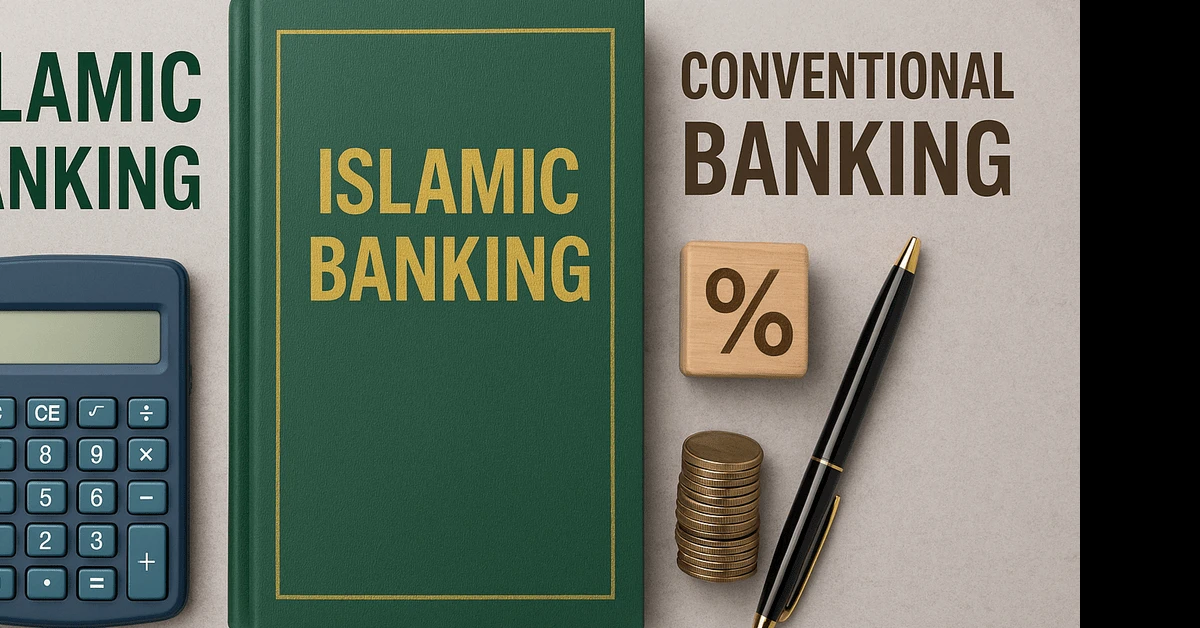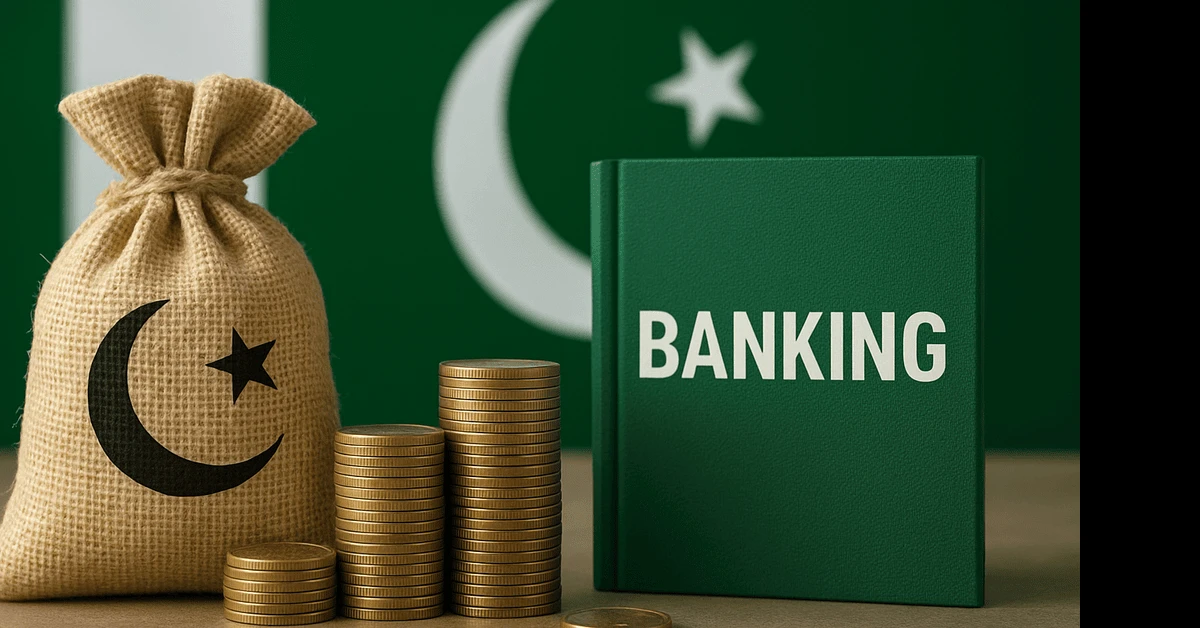Last Updated: November 3, 2025
Islamic by Label, Conventional by Operation: The Truth Behind Islamic Banking in Pakistan

The growth of Islamic banking in Pakistan has convinced many savers that they are entering a banking model free of interest (riba). But a closer look raises serious questions: Are the so-called “Islamic” saving accounts and investment products truly operating under the principles of Islamic finance, or simply rebranded conventional banking? This article examines the reality of banking labelled “Islamic” in Pakistan, how it diverges from classical Shariah-based frameworks, and what depositors should be aware of.
The rise of Islamic banking in Pakistan
Pakistan’s banking sector has witnessed the rapid expansion of institutions offering Islamic banking services. The regulatory framework has pushed for a transition to riba-free banking, with targets set by the central bank for the elimination of interest-based operations by 2027 or 2028. In this environment, Islamic banking now holds around one-fifth to one-quarter of the market share in assets and deposits in Pakistan.
Why the “Islamic” label matters
For many Pakistani savers the choice is deeply tied to faith. Conventional savings accounts that pay interest are avoided by those concerned about riba. Banks capitalised on this by offering “Islamic current accounts” and “Islamic savings accounts” to attract funds from customers seeking Shariah-compliant alternatives. The label signals religious compliance and builds trust. But the question remains whether the underlying operations align with the original Islamic finance principles.
Core principles of true Islamic finance
In classical Islamic finance the following principles are emphasised: - No riba (interest) in transactions. - Risk sharing: profits and losses are shared between participants (e.g., bank and customer) when capital is deployed. - Real asset backing: Transactions must be tied to tangible assets or real economic activity, not money lending for money’s sake. These principles define how an ideal Islamic banking system should function.
The gap between theory and practice
Despite the theoretical model, many Pakistani “Islamic banking” products resemble conventional banking: they offer guaranteed or near-guaranteed returns for depositors, and never share losses with them. True profit-loss sharing models (such as mudarabah or musharakah) are rare in the savings account context. This divergence has led scholars and critics to note that, in practice, many Islamic banks are “Islamic by label, conventional in operation.”
Saving accounts labelled “Islamic” — what’s really happening?
Savers opting for “Islamic savings accounts” in Pakistan often receive declared profit ratios. Yet classical Islamic finance mandates that returns must depend on actual profits generated from asset-based or trade-based ventures, and losses on such ventures would also affect depositors. No major Islamic bank in Pakistan has publicly shared depositor losses, suggesting that the risk-sharing model remains largely theoretical for retail savers.
Current accounts and permissible use
Current accounts play a different role. These accounts are primarily for transactional purposes—salary deposits, payments, remittances—and do not promise a return. Many scholars consider transactional current accounts permissible even in conventional banks, since they do not revolve around interest or profit obligations. Thus, the “Islamic current account” label is less controversial and more aligned with the functional need of modern banking.
Regulatory and structural challenges
Pakistan’s push toward a fully riba-free banking system faces several structural hurdles: - Islamic banks still operate within the same regulatory and monetary framework as conventional banks, making full separation difficult. - Some key Islamic banking contracts (murabaha, ijarah, etc.) are used widely; they avoid interest in name but critics argue they replicate the economic effect of interest. - The absence of genuine loss sharing in retail savings dilutes the classical model of Islamic finance. The result: many banks follow commercial banking practices under the “Islamic” banner.
Views of scholars and practitioners
Scholars are divided. Some argue that even if imperfect, Islamic banking offers a valuable alternative for customers avoiding riba. Others hold that unless profit-loss sharing is genuinely implemented, the label is misleading. Many stress the prophetic guidance: we should abstain from doubtful matters. If we are unsure whether the model is truly Shariah-compliant, then caution is recommended.
Implications for individual depositors
If you are a saver placing funds in an “Islamic bank” or “Islamic savings account,” consider the following: - Are the returns guaranteed or conditional on profit? If guaranteed, then the model resembles interest more than profit-loss sharing. - Does the bank disclose that depositors may share losses? If not, the risk-sharing aspect is missing. - What underlying assets or ventures does the bank invest your funds in? Are they actual trade or asset-backed activities? - Check the contractual terms carefully and ask your bank about how the profit is calculated and whether losses are shared.
Conclusion
Islamic banking has made strong inroads in Pakistan, offering many Muslims a financial alternative in line with faith-based values. However, in many retail products the model remains closely aligned to conventional banking. The transformation to a truly risk-sharing, riba-free system remains incomplete. For depositors, awareness is key. As the Prophet (peace be upon him) advised: if you are unsure about a matter, steer clear of it. In the modern banking landscape, ask questions, seek clarity, and make financial decisions consistent with both faith and informed understanding.
Frequently Asked Questions (FAQs)
Q: Is an “Islamic saving account” in Pakistan guaranteed to be riba-free?
A: While labelled Islamic, many such accounts offer declared profits and little or no disclosure of losses. That means they may operate more like interest-bearing accounts in effect.
Q: Should I avoid using an “Islamic current account” altogether?
A: Not necessarily. Current accounts used for daily transactions (salary, payments) above all are functional. The key is they should not promise a fixed return on deposits.
Q: What distinguishes “Islamic banking” from conventional banking in Pakistan?
A: In principle, Islamic banking emphasises profit-loss sharing, no interest, and real asset backing. In practice many institutions closely mirror conventional banks while using Islamic branding.
Q: How can I ensure a bank is truly operating on Islamic finance principles?
A: Ask how deposit funds are invested, whether depositors share losses, how returns are determined, and whether the bank’s model follows genuine trade or asset-based financing rather than simply renaming interest.
Q: What should I do if I believe the product is doubtful?
A: As a precaution, you may choose not to use the product until you receive satisfactory clarity. The prophetic guidance encourages avoiding doubtful matters to safeguard faith and ethical integrity.
You May Also Like:

Is There a Real Cure for Diabetes? The Truth Behind Social Media Claims...

The Rise of Islamic Finance in Pakistan: Can Full Sharia-Based Banking Be Viable by 2027?...

Mobile with Official Warranty in Pakistan: The Full Truth, Risks, Myths, and How to Verify a Genuine...

Why Pakistan Pushes Vaccination So Hard? Truth About Foreign Funding, Polio & Population Control...

HBL Freedom Accounts Are Being Converted to Islamic Accounts — No Benefits, No Way Back!...

Aisam-ul-Haq Retirement From Tennis: End of an Era for Pakistan’s Greatest Tennis Star...

A Special Condition Marked on Your HBL Account: Meaning, Causes, Fix and Your Rights in Pakistan...
